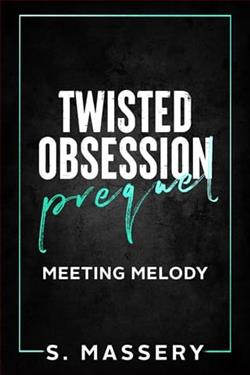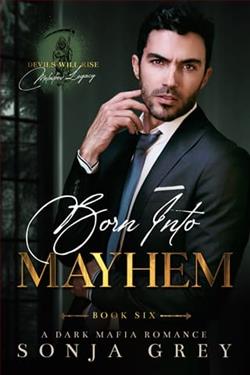Page 20 of The Heart We Guard
I flip the channel. Sports. Flip it again. Some old movie. Flip it again. AC.S.I. re-run.
Nothing grabs my attention.
My phone sits next to me on the arm of the sofa, and I glance at it when it buzzes.
This message is from Atom.
For some reason, his name is one of the easiest to read. Maybe it’s the four letters, and I never confuse the capital letterA.
My mom got me tested for dyslexia when I was a kid, after a teacher suggested it given the way I constantly mixed letters in a word up. And how I would complain of letters jumping around while I was reading. Letters blur together for me. Always have.
Normally, I’d just listen to the messages with a text-to-voice app I have. Makes life so much easier. But with Greer in earshot, I can’t do that.
At least that’s what I keep telling myself.
Because the peace and quiet of not having to deal with constant requests is a blessed relief. And I’m not missing the exhaustion that comes from navigating a world where everything from road signs to ingredients to orders is written in an alphabet I can’t keep in place.
So, I flip back to the old movie. It’s a classic action film. Guns blasting, brakes screeching, police siren screaming classic. A chase scene beneath the L in Chicago.
“Can you turn that down a bit?” Greer asks. “I’m trying to concentrate.”
“Sorry, Doc.”
“You know,” she says, pushing her chair away from the table and walking towards me, “films like this are part of the problem.”
I glance up at her. “And what problem is that, Doc?”
“Eighty percent of violent crime is committed by men. And there’s a whole”—she gestures in a circle with her hands—“infrastructural, societal, patriarchal…whatever the right word is…mess that causes it.”
I roll my eyes. “Doc, I’m not drunk enough or high enough for that kind of conversation.”
“Doesn’t make it less true, though.” She reaches for the tape holding down the gauze over my abdomen wound and lifts one corner to peer beneath it. “It’s healing well.” The words are muttered. Like they aren’t for me but for her. “Women have been cleaning up men’s trail of destruction since time began.”
I bite down on the grin that’s threatening. “Since time began, huh?”
“Yeah. I mean, let’s take white women in the middle ages. They were only ever involved in war because of their husbands’ alliances. And after battle, they’d be sent out to steal anything of value from dead or fallen soldiers. They had to nurse the wounded, but not be the doctor, because God forbid a woman gets educated. With the exception of a rare few, like Joan of Arc and Margaret of Anjou and Aoife MacMurrough, that’s all they could do. And there are even more examples around the world. Like Fu Hao, a Chinese Empress, and Ahhotep, Queen of Egypt.”
“But violenceisa man’s game. If someone broke into your house now, I would expect to fight off whoever it is, and I’d expect you to hide.”
Greer laughs at that. “For the record, if someone broke into this house right now, I would not go and hide. That’s what women do in movies, and then they end up being dragged from beneath the bed by one foot and then kidnapped, or worse. I’d find a weapon. Your gun. A knife from the kitchen. Whatever. And I’d fight. And, also for the record, I would be able to do everything so much better and faster than you. I’d beat you to your gun right now.”
I like how feisty she gets. Pink flushes her cheeks, and outrage sparks in her eyes. Bet it would be fun to tame a woman like that. “So, you’re more of a Joan of Arc and whoever those other broads were?”
“Broads?” Greer’s mouth drops open for a moment. “Broads?”
I simply grin.
“Margaret of Anjou, Queen of England, was known as the she-wolf queen. She helped end the Hundred Years’ War and led the Lancastrians into the famed Battle of Tewkesbury. She dared to rule at a time when it wasn’t seemly for the queen to be anything other than the consort of the king. And Aoife, also known as Red Eva…she led her troops into battle in a Norman society that was not ready for the Celtic warrior. They were notbroads. They were incredible women who refused to conform to the misogyny and patriarchy of their time and place.”
When she’s done, her chest heaves like she just ran a sprint. She’s not a particularly curvy woman, but I still find myself transfixed by the rapid rise of her small yet round breasts.
“Hate to point out the obvious, but they were each just one woman on the battlefield. I’m guessing their armies were wholly male.”
“I wasn’t there, so I wouldn’t know.”
Her answer makes me laugh. “Jesus, Greer. Sure. None of us were there. For all we know, none of our historical records are true. But if you had to make a hypothesis, you’d agree they were likely all men.”
She shrugs. “Fine. Probably. They all were. But they relied on their leader for training, payment, food, and advanced military tactics and precision. And they?—”















